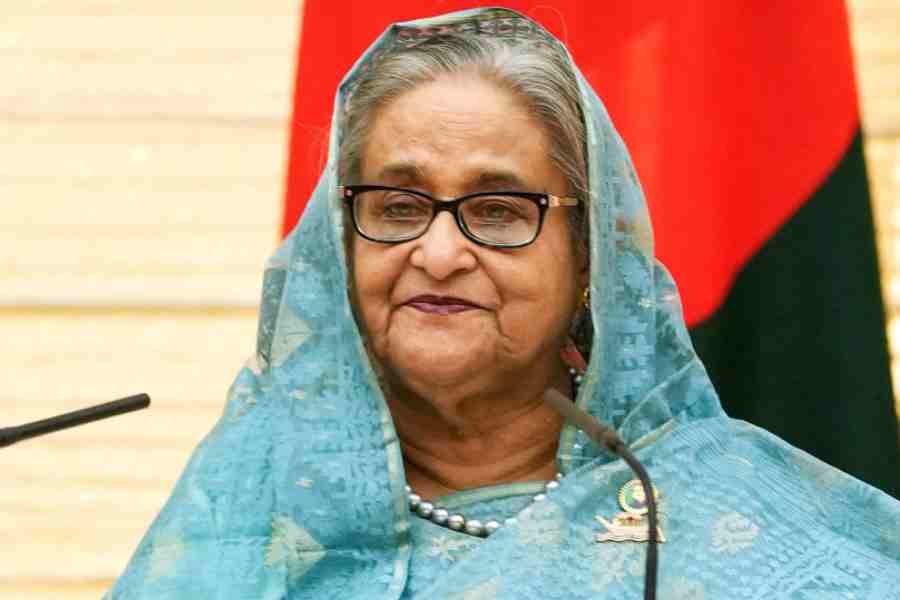China’s attempt to test the waters in Bangladesh by proposing to build reservoirs on the Teesta seems to have failed to impress the poll-bound Sheikh Hasina government, at least for now.
Bangladesh has said it would consider the “geopolitical issues” — which can be interpreted as India’s concerns — involving the project before taking a call.
A spokesperson for Dhaka’s foreign ministry, reacting to Chinese ambassador Yao Wen’s comments about a week ago that Beijing had received several proposals for the development of the Teesta basin in Bangladesh, confirmed China’s interest in a multipurpose Teesta river management project.
“They (China) have expressed willingness to extend cooperation for development work on the Bangladesh part of the Teesta. The concerned ministries and the Economic Relations Division would consider their proposal,” Saheli Sabrin said at a weekly media briefing.
The proposed multipurpose project — often touted as the most effective solution to farmers’ irrigation needs in large swathes of northern Bangladesh — involves dredging, building reservoirs, laying a drainage system along the Teesta, and constructing embankments and satellite cities on both banks.
However, the project involves strategic concerns for New Delhi as it will entail a Chinese presence within 100km of the India-Bangladesh border, close to the Chicken’s Neck, the narrow strip of land in north Bengal that connects the Northeast with the rest of India.
Asked how Dhaka would handle these Indian concerns, Sabrin said: “The government would take into cognisance the geopolitical issues in proceeding with the proposal.”
Sabrin’s comments, multiple strategic affairs experts in Delhi and Dhaka said, can be construed as Dhaka reassuring India that it would not involve China in matters related to the Teesta, a tributary of the Brahmaputra that originates in the Teesta Kangse glacier and flows through Sikkim and Bengal before entering Bangladesh.
Dhaka is desperate to seal a treaty with India on sharing the Teesta’s waters, but it has been stuck since 2011 because of Bengal chief minister Mamata Banerjee’s reservations.
Bangladesh claims that about 60 per cent of an estimated 90,000 hectares on the river’s banks remain unused in the dry season because of the lack of water in the Teesta.
But Hasina cannot afford to antagonise India by getting China into the picture, an expert said.
“The timing of this reassurance to Delhi is very important,” the expert added, alluding to the January 7 general election in Bangladesh.
Unlike western countries, especially the US, India has been firmly behind the Hasina government, which has swatted away Opposition demands for a poll-time caretaker government on the ground that the Constitution has no such provisions.
While the US-led western bloc has tried to prevail upon the Bangladesh election commission to engage in discussions with all the political parties to ensure their participation in the polls, India has declined to interfere in the neighbour’s internal affairs.
(The main Opposition force, the Bangladesh Nationalist Party, is not contesting the elections.)
“The US establishment may be talking about issues like the absence of democracy and human rights in Bangladesh under the Hasina government, but its primary concern is the ruling party’s apparent proximity to China.... India’s primary concern too is about the growing influence of China in Bangladesh,” a source said.
But New Delhi’s response has been different from Washington’s, which has announced a new visa regime for Bangladesh and threatened sanctions against those who try to undermine free and fair polls.
India has not only engaged with Bangladesh, it has tried to convince the US that putting too much pressure on the Hasina government would drive it closer to China.
“Against this backdrop, the spokesperson’s comments stressing that the government would take into cognisance geopolitical issues means a reassurance to India that the Hasina regime would maintain an arm’s length from China,” a source said.
China’s footprint has grown exponentially in Bangladesh over the past few years, with Beijing getting involved in the construction of power plants, railway lines, roads, a river tunnel and port modernisation.
Much to the chagrin of India and the US, Dhaka’s defence ties with Beijing too have grown manifold.
Hasina has always tried to convince New Delhi that it should not worry about the Bangladesh-China relationship as the two countries are development partners while Bangladesh’s bonding with India is organic.
During her visit to India in September for the G20 summit, Hasina had reaffirmed her country’s special relationship with India.
“The elections in Bangladesh will be closely observed by the international community.... Hasina will need India’s support for the validation of the election,” a source said.
“So, it’s not surprising that her government will try its best to address India’s concerns in the run-up to the polls.”
The source, however, would not speculate on how Hasina, set to become Prime Minister for the fourth straight time, might chart her course after the likely electoral victory.
Beijing is Dhaka’s biggest trading partner. There is little doubt that Hasina will need China’s support to retain the momentum of the economy, which has been growing at over 6 per cent for more than a decade.
“It remains to be seen how Hasina balances China, India and the US,” the source said.











